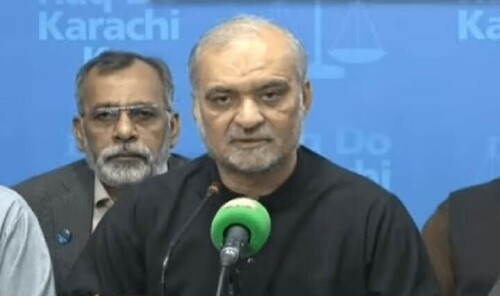ISLAMABAD: A lawyer known for struggling for the rights of local communities alarmed the Supreme Court on Thursday with his statement about mounting unrest among frustrated youths of Sindh’s Sanghar district who, according to him, were vulnerable to anti-state propaganda and agent provocateurs.
The district of Sanghar, along the border with India, has large-scale presence of petroleum exploration and production (E&P) companies engaged in oil and gas exploration. But, according to Anwar Mehmood Nizamani, a former president of the Sanghar Bar Association, jobs created by the industry there go largely to outsiders, thereby frustrating local youths and leaving them vulnerable to anti-Pakistan propaganda.
Mr Nizamani appeared before a two-judge Supreme Court bench headed by Justice Anwar Zaheer Jamali that had taken up the issue of implementation of its Dec 27, 2013, order relating to environmental pollution and dilapidated infrastructure caused by movement of heavy machinery and lack of corporate social responsibility in exploration areas, especially in Sanghar.
The Supreme Court had directed the federal, provincial and local governments to ensure that substantial funds were allocated for production bonuses, marine research fee, and maintaining a comprehensive account for meeting social welfare obligations and payment of royalties to districts where exploration companies were operating.
As a result of the court order a staggering amount of Rs780 billion was generated by the companies. The money is with the federal and the provincial governments, but it has not been utilised effectively because provincial authorities failed to work out a mechanism for its transparent operation.
Mr Nizamani bemoaned that Sindh was prone to the same anti-state sentiments as in Balochistan because of discrimination against indigenous people and depriving them of their share in natural resources explored in their areas. He later told Dawn that agents from a neighbouring country, easily sneaking into the district, were exploiting rampant joblessness and deprivation of youths of the area.
Mr Nizamani said the drilling companies were doling out jobs to people from other provinces or cities, but not to local people. He deplored that the funds generated by the companies were not being effectively utilised by the provinces for the benefit of local communities.
The court ordered the federal and provincial governments to submit a report on the exact nature of the funds generated so far.
The court also ordered chief secretaries of the provinces to collect complete data and come up with a comprehensive report, showing how much funds have been transferred to the provinces from the amount so generated and how much have been used under which heads in the districts concerned.
Published in Dawn, December 5th, 2014















































